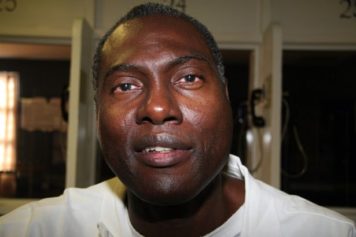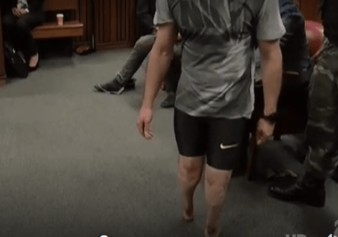Oscar Pistorius, after four days of combative hearings, was granted bail by a South African magistrate on Friday.
The double amputee track star who was a hero of the nation is accused of murdering his girlfriend in a case that has horrified and fascinated the continent and much of the world. Magistrate Desmond Nair announced the decision after impassioned final arguments from the defense and the prosecution in courtroom C of the Pretoria Magistrate’s Court.
The magistrate said Pistorius did not represent a flight risk and was not likely to interfere with state witnesses
“The accused has made a case to be released on bail,” he concluded, while the prosecution had not established a case for detaining him. Pistorius’ family members in the packed courtroom shouted, “Yes!”
Nair set bail at 1 million rand, about $112,000, and ordered a series of conditions before the case was adjourned to June 4. Pistorius was told to relinquish firearms and passports and to avoid his upscale home in a gated community where he shot to death his girlfriend, Reeva Steenkamp, in what he has called an accident and prosecutors have called premeditated murder. The home is now a crime scene.
The unusually tight restrictions on Pistorius also included a prohibition on making contact with witnesses. The athlete was also told that he could not leave the Pretoria area without official permission and could not use drugs or alcohol while the trial was pending. He was instructed to report to a police station twice a week.
Arnold Pistorius, an uncle who has acted as family spokesman, told reporters: “We are relieved by the fact that Oscar got bail today, but at the same time, we are in mourning for Reeva Steenkamp and her family.”
But Kim Myers, a friend of Steenkamp, said: “I think it is important to remember that someone lost their life.
“We trust and hope that justice will prevail.”
Before announcing his ruling, the magistrate recounted the four days of conflicting arguments by defense and prosecution lawyers. Pistorius’ shoulders shook with emotion and he wept when, at one point, Nair said, “The deceased died in his arms.”
Nair took issue particularly with the testimony and actions of the prosecution’s lead investigator, Detective Warrant Officer Hilton Botha, who has since been removed from the case. Nair said the officer made “several errors and concessions” and “blundered” in gathering evidence.
“It is his evidence that may have been tarnished by cross-examination, not the state case,” Nair said. At the same time, the state case was not so “strong and watertight” that Pistorius “must come to the conclusion that he has to flee,” he added.
In a two-hour summary of the case and of the laws governing bail, the magistrate also read a series of character references from the athlete’s friends, who described his relationship with Steenkamp, a 29-year-old model and law school graduate, as loving and happy.
The sprinter, who was born without fibula bones, underwent double amputation when he was 11 and uses prostheses.
The prosecution had opposed the sprinter’s application to be released on bail until a full trial, arguing that he might flee. The prosecution says that Pistorius, 26, murdered Steenkamp when he fired four shots through a locked bathroom door at his home on Feb. 14, while she was on the other side.
He has said he believed that the person in the bathroom was an intruder and he never intended to kill Steenkamp.
Nair said that while the prosecution case rested on “nothing more than circumstantial evidence,” there were “improbabilities that need to be explored” in Pistorius’s account of events.
“The only person who knows what happened there is the accused,” he said. But, he went on, “I cannot find that it has been established that the accused is a flight risk.”
Ultimately, he said, Pistorius had helped his case for bail by providing a sworn affidavit to the court setting out his version of events.


